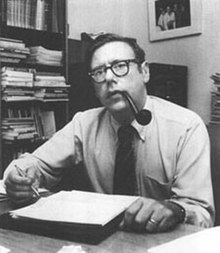Arthur Melvin Okun
Art Okun | |
|---|---|
 | |
| 7th Chair of the Council of Economic Advisers | |
| In office February 15, 1968 – January 20, 1969 | |
| President | Lyndon Johnson |
| Preceded by | Gardner Ackley |
| Succeeded by | Paul McCracken |
| Personal details | |
| Born | November 28, 1928 Jersey City, New Jersey, U.S. |
| Died | March 23, 1980 (aged 51) Washington, D.C., U.S. |
| Political party | Democratic |
| Education | Columbia University (BA, MA, PhD) |
| Academic career | |
| Field | Macroeconomics |
| Institution | Yale University |
| School or tradition | Neo-Keynesian economics |
| Doctoral advisor | Arthur F. Burns |
| Influences | John Maynard Keynes |
| Contributions | Okun's law Misery index |
Arthur Melvin "Art" Okun (November 28, 1928 – March 23, 1980) was an American economist. He served as the chairman of the Council of Economic Advisers between 1968 and 1969. Before serving on the C.E.A., he was a professor at Yale University and, afterwards, was a fellow at the Brookings Institution in Washington, D.C. In 1968 he was elected as a Fellow of the American Statistical Association.[1]
Okun is known in particular for promulgating Okun's law, an observed relationship that states that for every 1% increase in the unemployment rate, a country's GDP will be roughly an additional 2.5% lower than its potential GDP. He is also known as the creator of the misery index and the analogy of the deadweight loss of taxation with a leaky bucket.[2] He died on March 23, 1980, of a heart attack.[3]
Okun graduated from Columbia College in 1949 with the Albert Asher Green Memorial Prize for the highest GPA.[4] He went on to obtain a Ph.D. in economics from Columbia in 1956 before teaching at Yale University.[5]
Works
- Equality and Efficiency: The Big Tradeoff (Washington, D.C.: Brookings Institution, 1975)
- Prices and Quantities: A Macroeconomic Analysis, see here (1981) ISBN 0-8157-6480-4
See also
References
- ^ View/Search Fellows of the ASA Archived 2016-06-16 at the Wayback Machine, accessed 2016-08-20.
- ^ Okun, Arthur M. (1975), Equality and Efficiency: The Big Tradeoff. Washington, D.C.: Brookings Institution, 1975, pp. 91–92.
- ^ Arthur Okun Dies, Economic Adviser to Johnson, accessed 2020-08-14.
- ^ "COLUMBIA COLLEGE GIVES PRIZES TODAY; Arthur Okun to Get Award for Highest Scholarship Rating at Class Day Exercises". The New York Times. 1949-05-31. ISSN 0362-4331. Retrieved 2023-04-26.
- ^ "Arthur M. Okun | American economist | Britannica". www.britannica.com. Retrieved 2023-04-26.
External links
- Brookings Inst Bio and Obit
- Arthur M. Okun (1928–1980). Library of Economics and Liberty (2nd ed.). Liberty Fund. 2008.
{{cite book}}:|work=ignored (help) - "Arthur Okun Publication List" (PDF). Retrieved 2015-09-18.
- 1928 births
- 1980 deaths
- 20th-century American economists
- Columbia College (New York) alumni
- Columbia University alumni
- Economists from New Jersey
- Fellows of the American Statistical Association
- Fellows of the Econometric Society
- People from Jersey City, New Jersey
- Neo-Keynesian economists
- Yale University faculty
- Yale Sterling Professors
- Chairs of the United States Council of Economic Advisers

